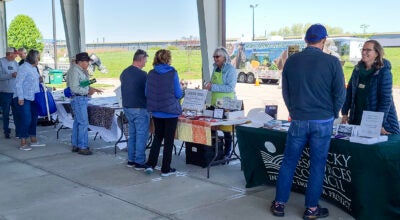Legislature looks to cut SNAP benefits, raise requirements
Published 5:45 pm Friday, March 15, 2024

- Rep. Wade Williams, R-Earlington, presents House Bill 367, an act related to public benefits, Thursday on the House floor. (LRC Public Information)
By Sarah Michels
Bluegrass Live
A bill that would cut SNAP benefits for at least 65,000 Kentuckians, including 21,400 children and 4,400 seniors, is making its way through the legislature.
Opponents are concerned about the impact on food stamp recipients’ ability to lift themselves out of poverty, as well as the potential downstream effects on the local food economy.
House Bill 367’s sponsor, Rep. Wade Williams, R-Earlington, said that the goal is to close loopholes allowing at least 34,000 able-bodied Kentuckians without dependents to use food stamps.
Williams cited several economic figures: Kentucky has over 130,000 open jobs and its workforce participation rate is one of the lowest in the nation, at 57.4%.
The Supplemental Nutrition Assistance Program, commonly referred to as food stamps, is a federal program that helps low-income Americans afford groceries.
The federal government pays for SNAP benefits, while states incur some administrative costs.
In Kentucky, households must meet a few criteria to qualify for SNAP. First, their total income must be at or below 200% of the federal poverty level. For a family of three, that amounts to about $49,000. Households including someone 60 or older are exempted from this rule.
HB367 would lower the threshold to 130% of the federal poverty level, or approximately $32,000 for a family of three.
Second, households must pass an asset test to ensure that the value of their possessions, including savings and non-essential goods like land and vehicles, doesn’t exceed a certain amount.
For years, Kentucky has been able to bypass this asset test alongside 42 other states as part of a federal policy – broad-based categorical eligibility.
HB367 would reinstate the requirement. The bill’s detractors argue that this “disincentivizes” SNAP recipients from earning higher wages or saving wisely to avoid having so much savings in their bank account that they lose their benefits.
Jordan Ojile of Feeding Kentucky said the asset test would require participants to have less than $2,750 in assets, making savings their “undoing.”
KyPolicy’s Dustin Pugel added that the asset test creates a cycle of poverty in which SNAP recipients earn or save enough to fail the asset test, lose their benefits, spend up all their savings to afford nutritious food, and end up back in the hole they started.
SNAP already has a cut-off point, Pugel said, but lowering the income threshold and reinstating the asset test makes that benefits cliff “sharper.”
Third, HB367 would eliminate waivers on SNAP work requirements for able-bodied adults. Work requirements state that recipients must work, volunteer or train for at least 20 hours a week.
Currently, Kentucky law states that the Cabinet for Health and Family Services can waive these work requirements in counties where the unemployment rate is at least 10% or other economic conditions are severe enough for a waiver.
If the entire state’s unemployment rate is at least 10%, the Cabinet could enforce a statewide work requirement waiver.
HB367 would take that power away from the Cabinet and instead grant it to the General Assembly.
Wade said the context for his bill is the current workforce shortage, and he sees this as a way to get more people into the workforce.
But Pugel sees it as undermining “Kentucky’s strongest tool to fight against hunger.”
What detractors are saying
One in 8 Kentuckians does not have enough food to eat, Pugel said in a press call speaking out against HB367 last week.
Pugel objects to the idea that SNAP participants don’t want to work, and are intentionally living off the government.
According to the USDA, food insecure households participate in the labor force at the same rate as the general public. Pugel said reinstated work requirements would disproportionately hurt eastern Kentuckians, who live in a region with unemployment rates well over 10%.
Daila Emerson, a food service director for the Bowling Green Independent School District, agreed.
“The misconception is that people are at home flipping Netflix and eating off of SNAP,” she said. “SNAP doesn’t make anybody rich, it’s not a cash cow. It is a lifeline, and most times, the lifeline doesn’t even support what their needs are. It’s a very minimum amount of money that they receive.”
Kimmie Ishmael of the Community Farm Alliance added that the bill would also harm beginning farmers, who earn an average of $26,000 to $30,000. SNAP is a safety net that allows them to save for the future, Ishmael said.
Not only will this hurt their ability to grow, but the downstream effects will reduce the buying power of their customer base, which largely uses SNAP incentives to afford double their money at local farmers markets.
On the House floor, Rep. Tina Bojanowski, D-Louisville, called it a “terrible, no good, very bad bill.”
HB367 passed the House 61-33, and now awaits a Senate committee hearing. Opponents hope that their voices have been heard, and the hearing never happens.
Todd Smith of the Kentucky Council of Churches said his organization “resoundingly and unequivocally rejects HB367.”
“It does not only ignore the needs of the poor, but actively takes away from them what little they already have,” Smith said. “To take food from people who are in need or an unjust crusade against the poor is not only immoral, it is anti-Christian.”






